You've probably wondered if sharing a bit of your juicy tomato with your canine companion is safe. It's known that ripe, red tomatoes offer nutritional benefits like vitamins A, C, and K, but what about the green ones or the plant itself? Interestingly, these contain a toxin called solanine, potentially harmful to your furry friend. But how harmful can it be? And what's the correct way to introduce tomatoes into their diet? These questions and more are worth exploring, especially considering your dog's overall wellness.
Understanding a Dog's Diet
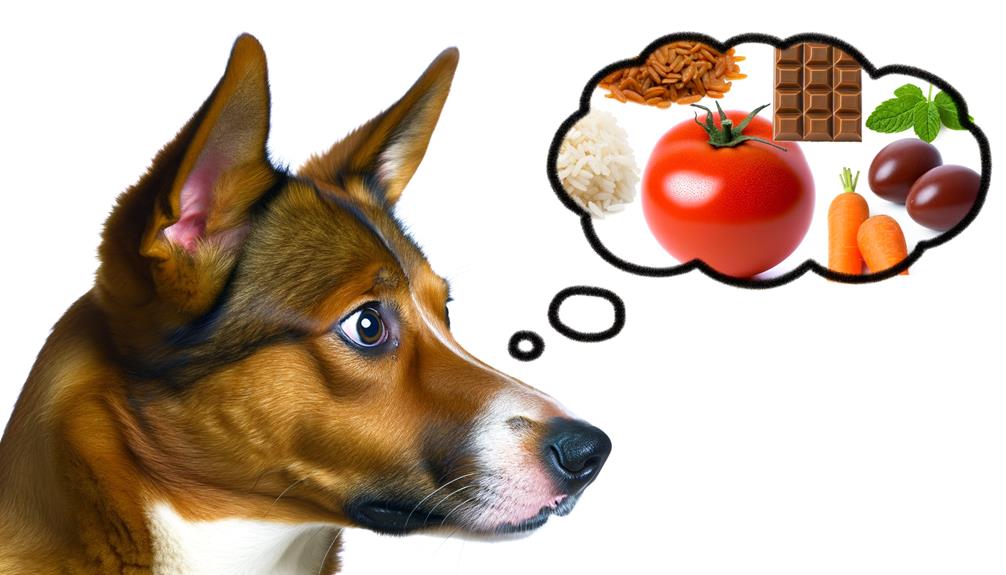
To fully comprehend whether tomatoes are safe for your dog, it's crucial to first understand what constitutes a healthy diet for them. Now, you might think that what's healthy for you is healthy for your dog, but that's not always the case. Dogs have different nutritional needs, and some foods can even be toxic to them.
One aspect you need to consider is your dog's allergies. Just like humans, dogs can be allergic to certain foods, including tomatoes. Symptoms can range from mild such as scratching and licking, to severe, like vomiting and diarrhea. If you're unsure, it's always best to consult with a vet before introducing new foods into your dog's diet.
Another important factor is your dog's breed. Some breeds have specific dietary requirements due to genetic predispositions. This is what's known as a breed specific diet. For instance, some breeds are prone to obesity and require a low-fat diet, while others may require more protein.
The Nutritional Value of Tomatoes
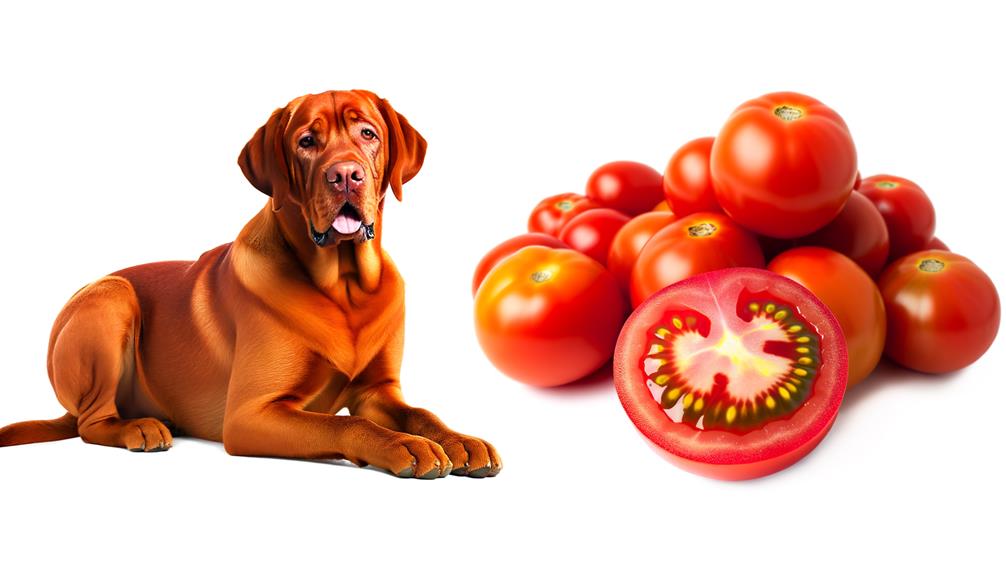
You might be wondering, 'what's in a tomato that's good for my dog?'
Well, tomatoes are packed with essential nutrients like vitamins A, C, and K, as well as the antioxidant lycopene.
However, it's important to understand how to safely offer this fruit to your furry friend.
Tomato's Health Benefits
Brimming with essential nutrients, tomatoes offer a wealth of health benefits that your dog can enjoy. Rich in vitamins A, C, and K, they're an excellent source of potassium and manganese. This nutritional powerhouse can boost your dog's immune system and promote healthy skin and coat.
While worries about tomato allergies may hold some pet owners back, these are relatively rare in dogs. Most dogs handle tomatoes just fine, but it's always a good idea to introduce new foods gradually.
For human consumption, tomatoes are a dietary staple and are celebrated for their heart health benefits. But remember, what's healthy for you mightn't be the same for your furry friend. Stay tuned to learn about tomato safety for dogs.
Tomato Safety for Dogs
While it's clear that tomatoes pack a nutritional punch, it's crucial to understand how they can safely be included in your dog's diet. Here are a few guidelines you should follow:
- Always serve tomatoes ripe and fresh and avoid green ones as they contain solanine, a substance that can cause tomato toxicity symptoms in dogs.
- Watch out for tomato allergies in dogs. If your pet shows signs like itching or redness after eating tomatoes, consult your vet immediately.
- Limit the quantity. Even if your dog loves tomatoes, they should be given in moderation.
Potential Health Benefits for Dogs
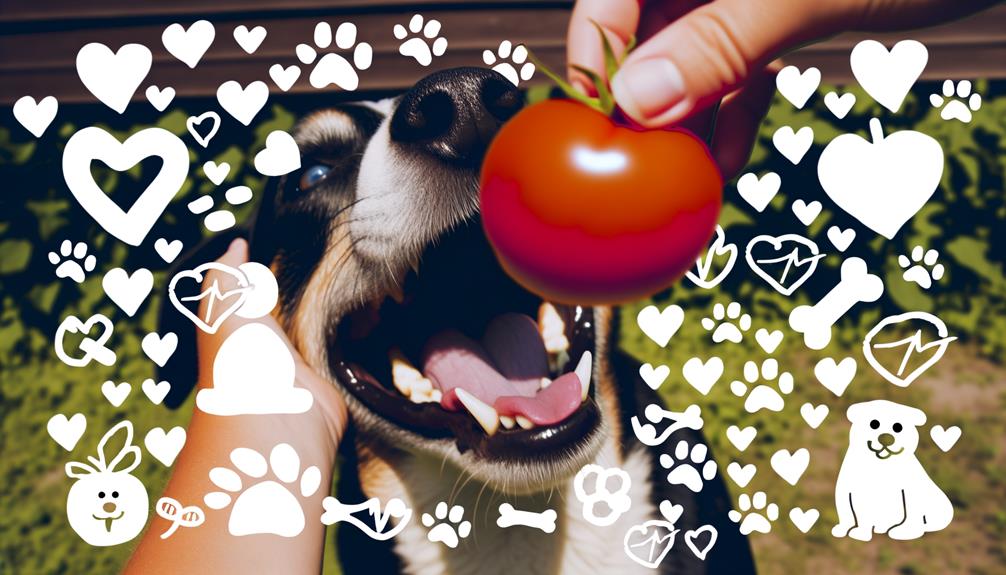
You might be wondering, 'What are the potential health benefits of tomatoes for dogs?'
Well, not only are tomatoes packed with nutrients that can boost your dog's overall health, but they can also promote better digestion and contribute to a healthier skin and coat.
Let's start exploring these points one by one.
Tomato Nutrient Profile
Tomatoes, packed with beneficial nutrients, could offer your dog several health advantages. They're a great source of vitamins A, C, and K, and also contain fiber, potassium, and antioxidants. However, it's important to keep in mind potential tomato allergies and plant toxicity.
The nutrients in tomatoes can provide numerous benefits for your dog:
- Vitamin A is essential for your dog's vision and immune system.
- Vitamin C can help combat free radicals, potentially reducing the risk of chronic diseases.
- Potassium is crucial for maintaining your dog's heart health.
However, green parts of the tomato plant can be toxic to dogs. So, always ensure your furry friend only gets the ripe fruit. Remember, moderation is key to prevent any potential tomato allergies.
Digestive Health Boost
In addition to the nutrients listed, the fiber found in tomatoes can also give your dog's digestive health a significant boost. They can help regulate bowel movements and reduce the risk of constipation.
However, it's crucial to be aware of tomato allergies that some dogs might have. These allergies can cause gastrointestinal upset, so monitor your dog carefully when introducing them to tomatoes. Breed sensitivities also play a role. Some breeds may be more prone to tomato allergies, so it's always a good idea to consult with your vet before adding tomatoes to your dog's diet.
Skin and Coat Benefits
Moving on from digestive health, let's not forget the potential benefits tomatoes can offer to your dog's skin and coat. Tomatoes, rich in antioxidants, are known to improve skin health.
However, you must bear in mind that:
- Some dogs may develop 'Tomato Allergies.' So, always introduce tomatoes slowly and watch for any adverse reactions.
- Regular tomato intake can lead to 'Coat Color Changes.' This is purely cosmetic and doesn't affect your dog's health.
- The antioxidants in tomatoes can strengthen your dog's coat, making it shinier and healthier.
Risks and Precautions of Feeding Tomatoes
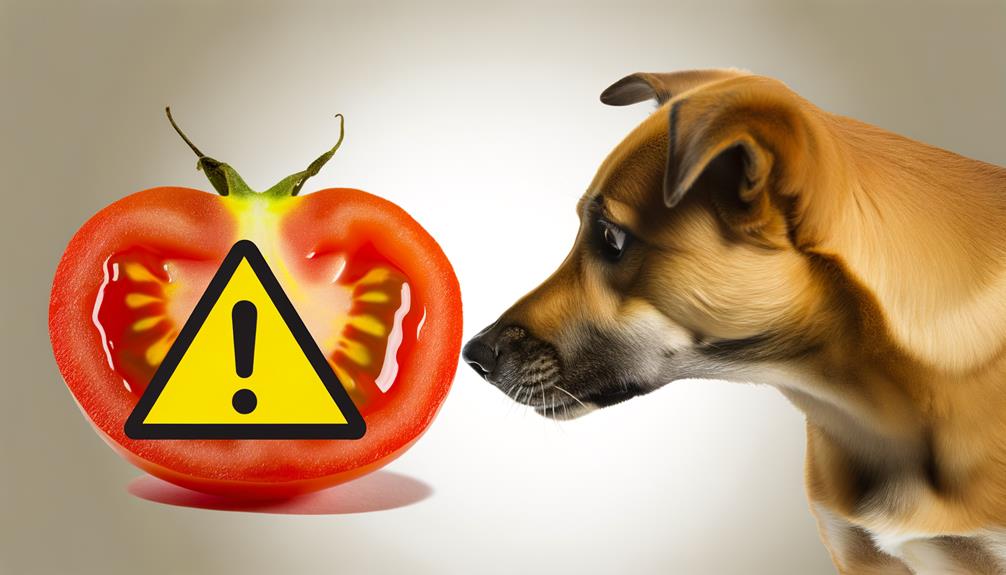
Before you consider giving your furry friend a taste of that juicy tomato, it's crucial to understand the potential risks and necessary precautions. The two main concerns are tomato allergies and poisonous varieties of tomatoes.
Some dogs may have an allergic reaction to tomatoes. Symptoms of tomato allergies can range from mild, such as itching or rashes, to severe, like difficulty breathing. If you notice any adverse reactions after your pooch has consumed tomatoes, it's best to consult a vet immediately.
As for poisonous varieties, it's not actually the fruit itself that's harmful. The green parts of the tomato plant, including the stems and leaves, contain solanine, a substance that's toxic to dogs. Consuming these parts can lead to solanine poisoning. Symptoms include drooling, vomiting, and even paralysis.
Tomatoes in the unripe, green stage also contain solanine. So, it's best to avoid giving these to your dog. Remember, only ripe, red tomatoes are safe for dogs.
In a nutshell, while tomatoes can offer health benefits to your dog, it's important to be aware of the potential risks and take necessary precautions.
How to Safely Introduce Tomatoes
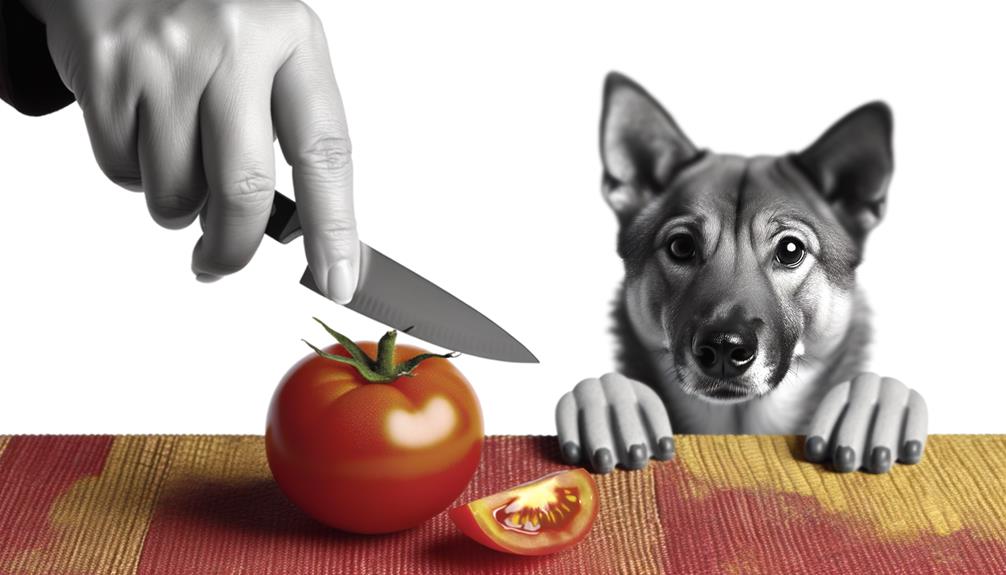
Now that you're aware of the potential risks, let's explore how to safely introduce tomatoes into your dog's diet. The key is to start slowly and observe your dog for signs of tomato allergies.
- First, begin with small quantities. It's recommended to start with a small piece of tomato. This will allow you to monitor your dog's reaction and ensure there are no adverse effects. If there are no signs of discomfort or allergic reactions, you can gradually increase the quantity.
- The second point to consider is the type of tomato and its ripeness. Always opt for ripe tomatoes as green ones contain more solanine, a substance that can be harmful to dogs.
- Finally, let's talk cooking methods. Cooking tomatoes can reduce the chance of your dog having a reaction to them. You might want to lightly cook the tomatoes before giving them to your dog. However, avoid adding spices or oils as these can upset your dog's stomach.
Keep in mind, every dog is unique, what works for one mightn't work for another. Always stay observant and consult your vet if you notice any negative reactions. Remember, moderation is key when introducing any new food to your dog's diet.
Veterinarian's Opinion on Dogs and Tomatoes

Let's delve into what veterinarians have to say about incorporating tomatoes into your dog's diet. Vets caution that while tomatoes aren't inherently toxic to dogs, they can pose certain risks. Some dogs might have Tomato Allergies. These allergies can manifest as itchy skin, diarrhea, vomiting, or even difficulty breathing. If you notice any of these symptoms after introducing tomatoes, it's crucial to contact your vet immediately.
Moreover, vets point out Breed Sensitivity. Certain breeds may be more sensitive to tomatoes than others. For example, small breeds or breeds with known food sensitivities could be more at risk. If you have any concerns about your dog's breed and its potential sensitivity to tomatoes, you should consult your vet.
Frequently Asked Questions
Are Certain Breeds More Tolerant to Tomatoes Than Others?
No, there's no breed-specific variation in tomato tolerance. All dogs react similarly to tomatoes. It's not about the breed, but the individual dog's health and tolerance. Always consult your vet before introducing new foods.
Can Puppies Eat Tomatoes?
You're wondering if puppies can enjoy tomatoes. While ripe tomatoes aren't harmful, unripe ones and the plant contain toxins. It's crucial to consider puppy nutrition and always consult a vet before adding new foods.
Can Tomato Sauce or Ketchup Be Safe for Dogs?
While tomato sauce and ketchup aren't toxic to dogs in small amounts, they're not ideal due to high sugar and salt content. Consider sauce alternatives to avoid any potential tomato toxicity levels in your pet's diet.
What Are the Symptoms if a Dog Has a Tomato Allergy?
If your dog is allergic to tomatoes, they might exhibit signs like itching, redness, and digestive issues. It's crucial to seek tomato allergy treatments and follow allergy prevention tips to keep your pet healthy.
How Often Should I Feed My Dog Tomatoes?
You shouldn't feed your dog tomatoes regularly. Consider 'Tomato Preparation Methods' and avoid raw tomatoes. Seasonal feeding's a good choice, perhaps a small amount in their meals during tomato season, but never as a daily staple.
Conclusion
So, can your dog eat tomatoes? Yes, but with caution. Ripe, red tomatoes offer nutritional benefits but remember, green tomatoes and the plant are toxic. Start slow, monitor for adverse reactions, and always consult your vet.
Every dog is unique, and breed-specific sensitivities or allergies can impact their reaction. When done right, adding tomatoes to your dog's diet can be a healthy, tasty addition.
Always prioritize your pup's safety and well-being.







